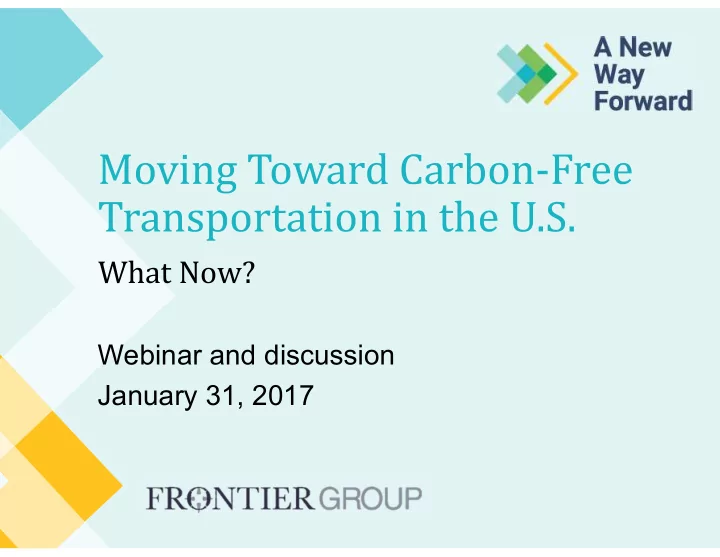

What Now? Webinar and discussion January 31, 2017
Tony Dutzik , Senior Policy Analyst, Frontier Group Frontier Group provides information and ideas to help citizens build a cleaner, healthier, fairer and more democratic America. www.frontiergroup.org
A New Way Forward: Transportation and Global Warming Supported by the William and Flora Hewlett Foundation
• Share findings and ideas from the New Way Forward project. • Spur conversation about next steps – local, state and federal. • Build connections and lay foundations for continued work.
1908
1916 FHWA
1916
1919
th From top left: Flickr user Eric Fischer, CC BY 2.0; Flickr user Richard Layman, CC BY NC 2.0; Flickr user Coltera: CC BY NC SA 2.0;
st Atlanta: Wikimedia user Atlantacitizen CC-BY-SA 3.0; Salt Lake City Eltiempo10 (Own work) CC BY-SA 4.0 via Wikimedia Commons; sprawl: Flickr user My Biggest Fan; median: Joe Szilyagi;
U.S. produces more carbon pollution from its transportation system than is produced by any entire country in the world other than China, India and Russia. Data: World Energy Council, Energy Efficiency Indicators , accessed 2 February 2016
Mark Dixon, CC BY 2.0
Transformation to a zero- or near-zero carbon transportation system is possible … and the tools exist today to make it happen.
Washington State Dept. of Transportation, via Flickr
Flickr user Denis Bocquet, CC BY 2.0
Flickr user James Willamoor, CC-BY-SA
U.S. DOT
Federal Highway Administration
Information Technology
The New Transportation Toolbox: Autonomous & Connected Vehicles? Wadud and Marsden eds Self Driving Cars: Will they Reduce Energy Use? 2016
Blue bars = reference case; Green bars = transformation scenarios Frontier Group, A New Way Forward
Salt Lake City: By Ron Reiring (Salt Lake City, UT Uploaded by X-Weinzar) [CC BY 2.0 (http://creativecommons.org/licenses/by/2.0)], via Wikimedia Commons; Atlanta: By Atlantacitizen at the English language Wikipedia, CC BY-SA 3.0, https://commons.wikimedia.org/w/index.php?curid=1811360; NYC subway: By Yanping Nora Soong
Building Up Fixing Up Linking Up Syncing Up Heinz lofts: Brook Ward, Flickr Charlotte Lynx: James Willamoor U.S. DOT
Atlantacitizen Wikimedia Commons
• Climate concerns should inform every transportation policy decision. • Low-carbon transportation should be at the front of the line for public funding. • People should be rewarded for making low-carbon transportation choices. • Carbon-intensive vehicles and fuels should be phased out. • Public policy should encourage climate-friendly communities. • Public policy should foster innovation.
Short-term • Climate change in environmental reviews. • Fuel economy and GHG standards, plus California/state authority. • Infrastructure
Source: AASHTO U.S. Mint Wikimedia User Steve Morgan, CC-BY-SA 3.0
www.frontiergroup.org @FrontierGroupUS tony@frontiergroup.org
Recommend
More recommend